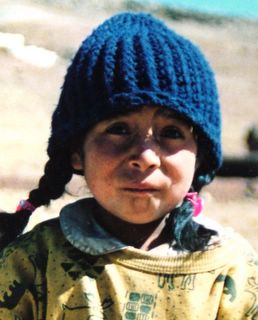
Andean girl in blue headpiece. Bolivian water at reasonable prices for all and larger amounts of gas incomes to remain in the country and used for development of infrastructure and education-programmes are her cold suggestions. (The photo is 13 years old, she should be in her twenties today, hopefully by now an assistant policy maker in parliament...)
Posted by Picasa
No blog about Bolivia these days can be without some references to the gas issue or as some like to call it the gas war that lead up to the election of Evo Morales as president in 2005.
In short it is a conflict over one of Bolivias natural resources, that started already in 2003 or even earlier. During the period 2003-2005 Bolivian campesinos joined forces to protest the foreign exploitation of the gas fields. The government at the time had in mind to export gas to the US, through a pipeline over Chile. The protesters argued that income from the gas fields were to stay in the country, providing the country with means for development in many other fields, in other words the view of the protesters was that the government intended to sell off the gas for a price far too low. Different strategies were during the course of the protests suggested: Larger taxes or exploitation fees for the foreing companies would make more money to stay in the country. Demands for a 100 % nationalization of the gas coompany also was put forward.
At the background of this Evo Morales was elected president. Here are some recent news on the matter:
"Bolivia to nationalise key industries
Bolivian President Evo Morales has promised to nationalise the country's key industries by 12 July. The president plans to renationalise the oil and gas industries, some of which are in foreign hands. Bolivia has the largest gas reserves in the region after Venezuela.
The Bolivian government also plans to launch a new campaign to convince Chile to give it access to the Pacific Ocean, which it lost in an 1879 war. The two countries broke off relations in 1979 after negotiations over the long-running land dispute failed. However, Mr Morales is hoping for a more favourable response from Chile's new president, Michelle Bachelet." Cited Radio Netherlands. Here is a recent US response: No problems to deal with left wing leaders as long as they are democratically elected. Read the whole article here.
The title-link is to the World News Network, Media Bolivia, the section on South America. More also here
I recently received information about my new sponsored child in Santa Cruz area in Bolivia. The information was provided by Plan-international and in the letter that came in the same envelope as the picture of the eleven year old girl I also got some more information about the so called "water issue". Evo Morales has in our media been described as a leader of the socialist party MAS. Many editors in our corner of the world have mainy concentrated ther articles about the left winds that are blowing over these parts of Latin America, and how the relationship with USA will be affected by such a left turn. Some have also adressed the fact that Evo Morales has been a coca-farmer at some point in his life and have made attempt at turning the attention to the issue of drug-trafficing between Latina America and the USA.
In the background is however a much broades scope of issues concerning mainly the Bolivians themselves.
The nationalization of water supplies has been briefly described and used as the key example of how the new government now is heading in a direction that is perhaps not so much appreciated in the USA. The vision is about Bolivia as a kind of new communist stronghold, comparable to Cuba or with a even more suppressive political climate if the socialists were to become the only ruling party in the country.
I think in focusing on the general left-right colour-scheme-thinking there is a serious risk of totally missing the point here.
According to Plan-International the water issue is about providing indigenous people, the farmers or the campesinors with fresh drinking-water. A matter vital to childrens health among other things. As the situation is right now for many people living in rural areas clean water is simply hard to come by and diseases such as cholera, intestinal parasites, acute respiratory diseases and diarrhoa, can easily spread.
" More than 83% are below the poverty-line and therefore can not satisfy their basic needs. The most serious problem in this area (Santa Cruz) is the lack of portable drinking water. In these communities, water is generally collected from rivers and wells, it is not boiled, and thus it is not drinkable. Water-borne diseases are abundant. Semi-urban area communities of Conception, San Javier and San Ramon are connected to main water system, which is bad and does not reach all houses. The major town and all communities lack appropriate sewage and solid waste processing" (The Plan-International, support a child, welcome letter)
It is actually quite strange to think that a company providing the people with such vital services as water supply and sewage-systems would NOT be a national one, owned by the people or the government of that particular country.
In Finland there are many types of corporations and companies run by the state, "nationalized" in other words in the sense that there are not mainly foreign stock-holders that control these companies, but instead a board posed directly under the government. The finnish system also allow for private ownership of course. In the case of Bolivia it is clear that the government will be in need for funding in order to both control and develop the water supply system. Weather these fundings are to come from abroad or from tax-payers is maybe not totally clear att this point. If it is to come from abroad, it is still vital that the control and development is maintained in the hands of the people and that everybody -equally, despite incomes or abilities to pay for the water, benefit from a renewed water-supply system.

Mrs C saw some things in Bolivia...:-)
Posted by Picasa
This week I have been busy with the music magazine and the blog has had to wait for a couple of days. During the weekend, however I watched a film by Walter Salles "The motorcycle diaries" telling the story of Ernesto "Che" Guevara and his friend Alberto Granado, who as young medicine students biked across Latin America. Che Guevara as an icon has been used in many circumstances until the extent that the real story about him has gone missing almost totally. This film puts it all back on track again. The story is taking place before Ernesto Guevara actually gets "political" and teams up with Fidel Castro and heads along the trail that will eventually get him killed by political opponents in Bolivia.
In the film Ernesto is a quite serious young man who suffers from asthma and who cannot manage a lie, not even a polite one... His companion Alberto is of the more laid-back cheerful sort. Together they make up a functional team and travel trough many of the Latin American countries. In the beginning of the trip they enjoy the ride, but as the motorbike brakes down they have to continue hiking and in this way they come to meet many other people on the road and hear their stories. There are the indian farmers who lost their farmstead to a rich landowner, the miners without safety-net, Silvia and the others at the leper-colony in Peru. All these various destinies have an effect upon Ernesto's mind and in the end of the film at his twentyfourth birtday, celebrated at the leper-colony, he makes his first speach, a straight-forward one, expressing his gratitude for the welcoming he has received in the different countries, but also telling about a dream of a united Latin America and a hope for change...
The film is based on a true story, told by 80-year old Alberto Granada who also participated in the making of the film, by guiding the director through his memories of the trip he did together with Ernesto Guevara.
I thought it was a very touching film and also a good way of reaching a better understanding of the political climate of Latin America. The headline-link tell about the film-maker. Here also a more critical voice about the film-project. But my suggestion is to see the film first as it is intended: an open-eyed honest document about Latin America in the fifties. THEN try to learn more about Che Guevara later in life and as political icon.

Chapare boy at Consejo Yuqui.
Posted by Picasa
In "The clash of civilisations and the remaking of a new world order", a book by Samuel P. Huntington civilisations are defined as parts of the world which share a religion and a written language. The civilisations most commonly referred to as clashing are most often "The West" and "The East". According to Huntington also large parts of South America and Africa are not parts of any civilization at all, since they are classified as "primitive" and have neither a common religion nor literature. But what if the whole idea of clashing civilisations are too simplified a model and instead of civilisations we ought to study cultures? It would certainly be a much more pluralistic approach. Here is a guide to Latin American languages to start with.
"There are some 56 language families and 73 isolates (a language with no known relatives) in Latin America (Kaufman, 1994a&b). For comparison, there are only two language families in Europe - Indo-European and Finno-Ugric - and one isolate, Basque." (The quote is from the site, linked abowe.)
The headline-link is to a site with quechua vocabulaire, jokes, music, images. In short: Some glimpses of the quechua culture. And here is another which suggest quechua is actually a lingua franca, thought all over the world...almost!



